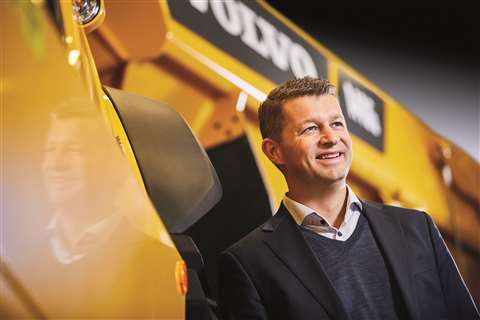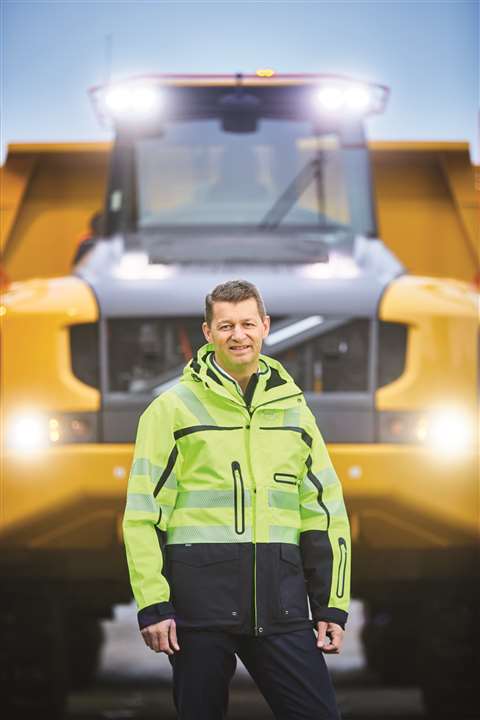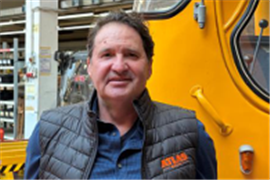‘A special era’ says Volvo CE president
03 September 2018

Six months into the role as president of Volvo Construction Equipment (CE), Melker Jernberg is at the helm of a company that has made sure it has been at the forefront of the technological advances that are, perhaps, the defining factors of the construction industry today.
Speaking at Volvo CE’s Eskilstuna, Sweden, facility, he said he thought this would prove to be a special era for the industry.
“When we are retired and looking back, or when our children are working,” he said, “even if only 50% of what could happen will happen, then it will have been big changes.
“You can debate if autonomous cars’ level five (fully autonomous everywhere) will happen or not happen. It’s not worth spending time on that because then you get stuck into whether it will be a car without a steering wheel or not. It’s not about that. It’s about how we can use the technology, have a better life and be more productive.”
Even if the new technology takes ten years to come to fruition, which he said he didn’t think would be the case for most instances, he said the changes were quick.
“For example, in the 1950s to 1960s, nothing – it’s only ten years but this will be a very special era.”
Moving quickly
On the question of who is leading the drive for innovation, Jernberg said, “We have more discussions with customers today about the future than we had a year ago. It’s moving quickly.”
It is a very interesting period in time, he said, adding that there were many things to try to understand – for OEMs (original equipment manufacturers) but also from the customer perspective.
“We have a lot of interest and good discussions. We have a lot of discussions with customers around the world on different projects.”
While that highlights the innovative nature of the industry, he agreed there was a conservative aspect too. To illustrate this, he used the example of tiltrotators. He pointed out that he had seen them used for, perhaps, 20 years in Sweden.
“How come it takes 20 years for so many developed countries to even start to try them – and it’s not that the suppliers of tiltrotators are promoting them badly. It’s something else.”
He said it was not hard to discuss topics like this with customers, wherever they were from. “You always get the truth,” he said.
He described the industry as being a “fun” place to work – a word he used several times – but he added, “The conservative part is not real easy to understand.”
Jernberg’s first six months as president proved to be busy, and he had to decide how to divide up his time during this period. As 2017 had been a good year for the company, he felt this gave him the luxury of being able to choose what to do.
So he spent more or less the whole spring season travelling, claiming to have visited much of the Volvo CE network – R&D (research and development) facilities, production plants and joint ventures – with the exception of plant in India and the sales hub in Singapore which are still on his agenda.
“Eskilstuna is a little bit special because here is a big plant, it’s the EMEA (Europe, Middle East and Africa) sales hub, and it’s also the biggest technology and R&D facility.
“We have a really small office of 50 people in Gothenburg, and the rest is out on the sites. So while it was not the only way, it was the best way for me to get to grips with activities and also the people.”
Distribution
The other element is distribution – “our way of selling”, as he put it.
Jernberg said, “I think today the number is 212 companies around the world. These are dealers that are selling our products, and that is the real customer interface, which is most important.
“And out of this 212, we own – I guess – 12, and the other 200 are private. Of course I have not been able to visit 212 companies, but we have had dealer conferences so I met, I think, all of the EMEA dealers, almost all of the North American dealers, some of the South American, and many in China and many in APAC (Asia-Paciifc) on different occasions.”
He said this first chance to get in touch with the dealers was important, so that he could see the full game.
“It is important for me to know them. If we take away the industrial operation of our company, then what we are doing is working with dealer development, or dealer co-operation, and how we develop good concepts for our customers together with our dealers, because it really is a joint effort.
“From that perspective, it is an extremely important part of our work to have dealers that are thinking in the same way that we are. And, in general, we have many, many extremely good dealers who are professional, and that helps us to drive what’s important for the customer. So that’s why it’s so important.”
Jernberg has a desire for the Volvo CE staff to be able to operate the machines at the heart of the business.
“That is half fun, half serious,” he said. “I think it was at the first management meeting we had that I said we were going to drive machines, and suddenly I realised that half of them haven’t done it, or haven’t done it for the last 10 years or whatever.”
While he admitted it was more for the people on the technology side of the business, and for sales people, even HR and the legal department could benefit.
“How can you really be good if you don’t do it. You don’t need to be a good driver, but of course the most important thing is to understand our customers’ business.”
He added that, of course, the customer’s business had to be understood from a wider perspective than simply driving a machine, “but you need at least to understand how to start it and try to drive it”.
He said with a laugh, “Maybe they feel it’s a big demand, but it’s an extremely small demand from my side!”
While business has been good, Jernberg said, “I think it’s a little bit dangerous to try to forecast the future by looking only in the mirror. We are in the cyclical business, of course, and it has ups and downs.
“What I can see is that it’s good, but then you try to understand why.
“Of course, it’s a better business environment – but there have also been some tough years.”

For Jernberg, success has been a mix of “good business, a good environment and good need”, but also a great deal of replacement.
“It’s not extremely easy to calculate replacement cycles.”
He said there had been positive figures in all regions, which on the face of it would be desirable, but could create problems.
“Normally we say it is good to be as global as we are, as you can always compensate a bit for a bad market. But now it’s been good all over and 2018 will be a good year, and then we don’t know.”
Chinese peak
The high numbers seen ten years ago before the global financial crash were followed later on by the Chinese peak.
“These two things have destroyed the pattern a little bit. I think if I could, of course, I would choose a smaller amplitude of the ups and downs, but maybe that’s hard to get. I don’t want to have it when it’s too quick, then they bottom out too quickly. Then it’s not good for customers, not good for companies, and not good for people.”
He said, however, that he was optimistic. While the question of whether the market was reaching pre-crisis levels again was a common one, he said he didn’t spend much time trying to understand if it was actually at that peak.
“I spend time on whether it’s a good level, a high level, how we perform, how we are a good partner, and how we give good service to our customers.”
He is also considering how to prepare to be a good company. He said that performing when there was a downturn was important, as it was much easier to be successful when the market was buoyant.
He said that he was sure that a really good company was also successful when times were tough. In better times, sales functions, aftersales and new developments, both short- and long-term projects, mean the company is busy. He felt that when times were less good, it was necessary to be able to take the right decisions.
“That is really the period when you can do good things for the next up times. So it’s important for me to be able to be a good company both in up times and down times. That’s much more important than trying to point out the peak, or something like that.”
He added that it was also crucial “to have the courage and strength, both financial and from a management perspective, to invest.
“So then you can invest in capacity and buildings. You can invest in people and, of course, in products and the future. You can invest time in understanding what you can do for the customer in the next phase. So all these soft and hard financial and mental investments are easier to do if you are capable of doing them in a downturn. From a cynical perspective it’s much cheaper to do it in a downturn.”




